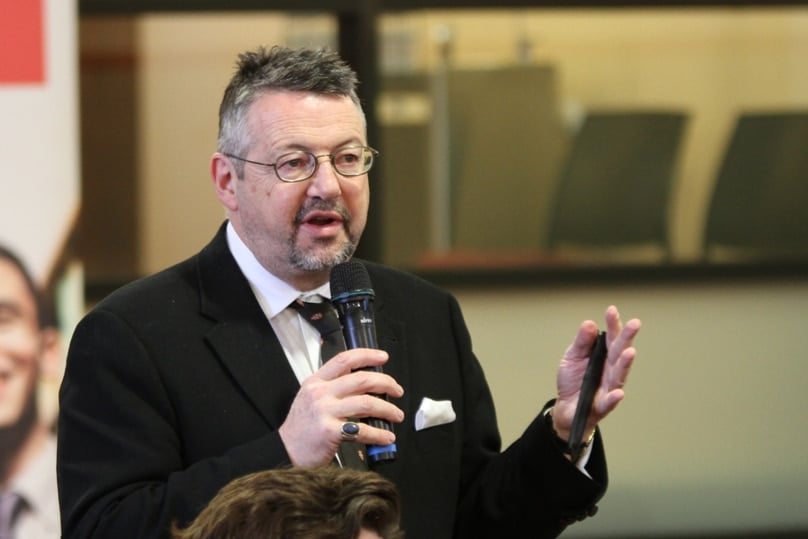
A constitutional lawyer and religious liberty expert says the Church has conspired in its own decline through its use of the facile language of “values”, replacing a search for truth and the cultivation of virtues with process and platitudes.
Professor Iain Benson delivered the 2016 Religious Liberty Lecture at the University of Notre Dame, Sydney, on 18 August, following similar addresses in the past two months to Campion College and to the Humanist Society of NSW. Prof Benson recently joined the university’s law faculty after teaching in South Africa, as well as participating in several legal cases involved in the wave of aggressive secularisation which has swept across his native Canada in recent decades.
In the lecture, Prof Benson argued that Western democracies had ceased to teach that justice – as a virtue – is a matter of discovering what is true, and had instead adopted a false idea of justice as striking an apparently ‘neutral’ balance between competing “values”.
Describing values as “the debased moral currency of our time,” he said they masked, in their apparent warmth and vagueness, the tyranny of eventual outcomes.
“[As] Hannah Arendt obeserves … ‘nowadays, it is rare to meet people who believe they possess the truth; instead we are constantly confronted by those who are sure they are right’ …
“What masquerades for justice when it is no longer a virtue is a power unchecked by moral evaluation … Law cannot be the measure of justice. Just as you cannot measure a yard-stick by itself, so the measure of justice must be, in a sense, ‘beyond’ the mere validity of the law as commanded.”
The illiberal nature of contemporary secular democracies was manifesting itself in recent debates around same-sex marriage and programs of “indoctrination” such as that of the Safe Schools Coalition.
“This is a time in which equality is on everyone’s lips, but it’s being used to affect inequality,” he said at Campion.
“Diversity is being used to affect homogeneity, and discrimination is being used to affect discrimination.”
In his lecture at Notre Dame, he said there were “suggestions that some people view the school classroom in Australia like their fellow travellers (in Canada) – as settings where co-option of children is permissible under the rubric of ‘preventing bullying’ or ‘preventing discrimination’, though in both cases it is one group of parents and children that are being bullied and discriminated by those who view the public classroom as a place for indoctrination”.
As in Canada, there were politicians who did not believe in recognising any protections for religious groups in relation to same-sex marriage.
“Implicit in this approach is that everyone should believe the same thing about the nature of marriage. But to force this on traditions that have a different view of both sexuality and marriage is hardly showing respect for ‘diversity’, the very thing that was argued as allowing same-sex marriage in the first place.”
Sadly, he said, the Church had bought into the language of “values”, effectively – if unconsciously – proposing its understanding of the truth as ‘one among many’ in a marketplace of ideas, severing its claim to know – through revelation or reason – reality itself.
“How did we get into this mess? Well, partly because we, those of us who have called ourselves Christians have played into it … speaking of (binaries such as) ‘religion’ and the ‘the secular’, ‘believers’ and ‘unbelievers’ …”
“Religion is bracketed out of the secular, and the secular is everything: public education, ethics, the law, politics, the self,” Prof Benson said.
Catholicism and the great moral traditions of human history did not acknowledge such distinctions.
“Catholic virtues and the understanding of the moral life are an objective adventure – objective in the sense that it’s real and it’s out there, and an adventure because we have to figure out how it is with us individually in relation to the virtues.”
In the question and answer session that followed his lecture at Notre Dame, the professor was asked how to deal with the phenomenon of people meeting reasoned arguments with unreasoned charges of “cisgender privilege”, “heterosexism” and other retorts.
“An ‘identity threat’ is something people have elevated into a rhetorical door slam. And if you raise an identity threat on certain key categories, the ability to discuss it … is absolutely truncated. This is a real problem.
“Dialogue is the way that a compassionate, open and reasoning society should come to know how they live together … One of the things we have to get off the table is that we’re looking for agreement – we’re not. We’re looking for a modus vivendi (mode of living) … The only way around (disagreement) is to create a culture of respect for difference.”
